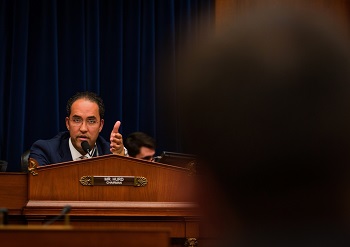I’m Grateful for the Border Spending Bill; But it’s Still not Enough.
 Last week, the U.S. House passed a $4.6 billion emergency spending bill to address the humanitarian crisis on the southern border. The bill, already passed by the Senate, now heads to the president, who’s likely to sign it.
Last week, the U.S. House passed a $4.6 billion emergency spending bill to address the humanitarian crisis on the southern border. The bill, already passed by the Senate, now heads to the president, who’s likely to sign it.
As the member of Congress who represents more of the U.S.-Mexico border than anyone else, I can tell you with certainty that what is happening on our border is unprecedented and getting worse every day. The tragic image of a father and his daughter drowned on the banks of the Rio Grande may have shocked the nation, but such scenes of desperation are not new to those of us who live in border communities.
For that reason, I welcome the border spending bill happily — but this is only a short-term fix. Congress and the administration must do more to address this crisis.
The tragic conditions at detention facilities are the result of an intense surge in migration across the border. Near-record apprehensions — including those of thousands of unaccompanied minors — are pushing detention facilities such as the one in Clint, Tex., to significant overcapacity. The space, resources and manpower hours necessary to care for these minors poses major challenges for personnel and infrastructure already stretched thin.
While citizens ask for actions to prevent these symptoms, they have seen only partisan rhetoric and political one-upmanship. The warring parties care more about proving the other side wrong than making any type of progress — even incremental — for fear of the other side getting a political win.
The spending bill will help, but it doesn’t get at the root causes of mass migration: violence, extreme poverty and lack of economic opportunity in the Northern Triangle, made up of El Salvador, Honduras and Guatemala. Just imagine how bad the situation must be in their home countries for these migrants to risk a dangerous, 2,300-mile trip over land from Central America to South or West Texas.
This mass migration is not just a problem for these three countries or the United States and Mexico. It is a problem for the entire Western Hemisphere. That is why the secretary of state should immediately appoint a special representative for the Northern Triangle to ensure a unity of effort across the U.S. government on foreign aid programs in the region. The special representative should lead efforts to engage with our other partners in the hemisphere to coordinate development efforts and build political and diplomatic will among international organizations working in the region. Solving the problem over there will take a fraction of the cost of trying to do it once it reaches our shores.
Additionally, we must dismantle the infrastructure created by human smugglers. Whether you are on the left or the right, we should all agree that organized human smugglers are putting innocent lives at risk. As a former undercover officer in the CIA, I am appalled that we are not maximizing the use of intelligence to deny and disrupt these transnational smuggling networks. In May, 144,000 people were detained at our border. Almost every one of them had a phone number of a smuggler, a license plate of a bus that brought them here or a pickup location in their home country. The national security adviser and director of national intelligence should make understanding and disabling these networks a top priority.
This crisis has also exposed the need to update our asylum laws. Our laws — passed in the 1980s — are ill-equipped for the type of abuse we are witnessing today, making it so we cannot protect those actually fleeing persecution. With a backlog of more than 900,000 cases, asylum seekers must wait an average of two years for their cases to be heard. We need more immigration judges to get to a system that can adjudicate a case within nine months, and I’ve proposed reforms, including requiring migrants to claim asylum at ports of entry to end the cycle that encourages illegal immigration, diverts resources from those with legitimate claims and, in many cases, actually rewards the human smugglers who thrive on the perpetuation of this outdated system.
Such fixes — along with streamlining legal immigration — are straightforward ways to solve root causes of the current crisis. But, as is often the case in Washington, politics gets in the way. Because elections are won by creating contrasts between candidates, the fact that more unites us than divides us is usually overlooked.
The continuous images of suffering can be used as political bludgeons or to tug at our hearts. We have a chance now to use these images as a call to bipartisanship instead of a call to arms. We have a chance to accomplish big things by working together as our country has done since its founding, and I encourage my colleagues to remember that as we face this crisis head-on. Our country has the ingenuity and capability to fix these problems; the question is whether we can find the political will.








